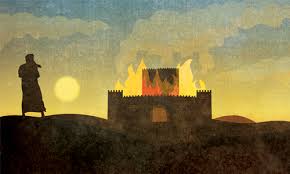Judah’s Guilt and Punishment
2:1 to 6:30
Judah’s guilt and punishment REFLECT: Choose one verse or phrase from these chapters that stands out to you. This could be something you’re intrigued by, something that makes you uncomfortable, something that puzzles you, something that resonates with you, or just something you want to examine further. Write a paragraph about it.
During the reign of Josiah

In 627 BC God sent Jeremiah to Jerusalem to give a series of messages to the people of Judah. Following the account of Yirmeyahu’s commission is a collection of oracles, prose and poetic, that seems to have come mainly from his early ministry midway through the reign of Josiah who was the most receptive of all the kings to his radical message. Despite much repetition, a progression of thought can be discerned. God’s people have been faithless (2:1-37). The Lord calls His people to return (shuwb) to Him (3:1 to 4:4). ADONAI warns that if His people fail to return (shuwb), He must punish them by sending an enemy from the north (4:5-31). Then the next chapter restates the faithlessness of YHVH’s people and warns again about the invasion (5:1-31), and the final chapter (6:1-30) sums up the dreaded message of the whole section. These chapters deal with the near total apostasy of Judah and the inevitable foreign invasion that served as ADONAI’s retribution.
The portrait of Jeremiah that began to emerge in the first chapter is enriched. We see the prophet maturing before our eyes, from the youth who pled his inexperience (1:6), through the eager preacher, calling expectantly for a verdict (3:22), then the careful searcher who seeks facts, not emotional opinion (5:1). We see the grief of Yirmeyahu endured as God’s messenger (4:19). We see him close to the breaking point as he tries to keep his anger . . . Ha’Shem’s anger . . . held in check (6:1). And finally we see his mature realization of his role. He is ADONAI’s assayer, who discovers that Judah, instead of silver, is slag metal (6:27-30). The priest from Anathoth remains a timid man who shrinks from conflict, but he has a message to deliver, and he attempts to deliver it, whatever the cost.
But more importantly, we begin to see the portrait of God emerging from the shadows. We see Ha’Shem’s stern inflexible purpose that Amos portrayed, with the divine concern for clean hands and a pure heart rather than correct ceremony. We see the bruised love that Hosea portrayed, the love of a husband whose wife had deceived and betrayed him, yet he keeps on loving her. And we begin in this section to see the LORD’s pain when His people sin. Philosophical theology doesn’t know quite how to handle this divine pain; it doesn’t fit into any system . . . so much the worse for philosophical theology. Yirmeyahu knew ADONAI, and his words help us to know the God who grieves when we go our own way.25



Leave A Comment